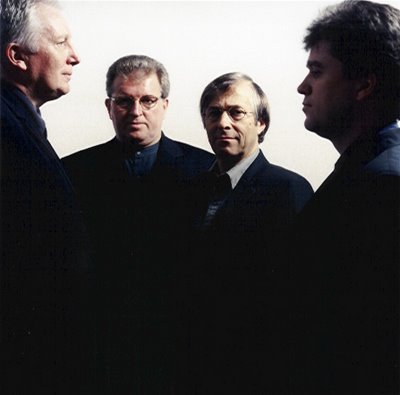Hilliard Ensemble at the Freer
 Hilliard Ensemble (L to R, Gordon Jones, David James, Rogers Covey-Crump, Steven Harrold), photo by Friedrun Reinhold |
The program takes its name, Arkhangelos, from a piece of that title by English composer Ivan Moody (b. 1964). The text is a 6th-century poem by Agathius Scholasticus, about how a person's mind is affected by meditating on an icon of St. Michael. The musical setting is appropriately inward and mysterious, mostly with very pretty sounds. It goes well with a piece near it in the program, Arvo Pärt's Most Holy Mother of God, an ecstatic litany on the words "Most Holy Mother of God, save us" premiered by the Hilliard Ensemble in 2005. The texture of this piece alternates between layering of slow melodic lines and a harried homorhythmic mantra-like section, which grows from piano in an arching crescendo.
The group also had fine moments in another work composed for them, Alexander Raskatov's Praise, a setting of five liturgical texts from the Liturgy of St. John Chrysostom. The very dissonant logic of the first piece, Hymn of the Cherubim, meant that at crucial points, unisons solemnly resolved to seconds, as Raskatov used grating dissonance, piled up in succession, to propel the piece through rocking swells. The opposite effect is achieved in the second piece, The Lord's Prayer, where at certain points the four voices end up on the same note in four different octaves. Gentle Light contrasts the declamation of the text in highest and lowest voices with an ison (drone) of ostinato with glissandi in the middle voices. The fourth movement's speech rhythms were, frankly, a little silly, but the minimalistic repetition of the pulsing fifth movement was exciting, speeding up like a whirling dervish to a sudden end.
| Hilliard Ensemble: Gombert (2006) Review Mnemosyne, with Jan Garbarek (1999) |
The group's vocal quality occasionally shows its age, but nothing more serious than an occasional instability or stridency. Countertenor David James sounded slightly constricted and scratchy in the Nonantolan chant Ote to stauron he sang alone. However, he also had an excellent turn on the top of Sirt in sasani, the strangest and most intriguing sharakan. Its text puzzled me ("My heart trembles, I am terrified, on account of Judah") because it is so fragmentary. After some reflection, the source came to me, from the prophecy of Egypt's fall to Israel (Isaiah 19:16-17), with an interesting liturgical twist, to cast the text in the voice of an Egyptian:
In that day the Egyptians will be like women. They will shudder with fear at the uplifted hand that the LORD Almighty raises against them. And the land of Judah will bring terror to the Egyptians; everyone to whom Judah is mentioned will be terrified, because of what the LORD Almighty is planning against them.Baritone Gordon Jones's solo in one of the Armenian pieces, Bazmutyung hreshtakac, revealed a voice still remarkably round and full. Although this was an excellent program, I confess with some guilt that my hunger for some Gombert or Tallis only worsened as the evening progressed. That desire was to remain unsated, as even the encore was a modern piece, an arrangement by Estonian composer Veljo Tormis of a traditional lullaby the group recorded on their 1999 recording with saxophonist Jan Garbarek.
The next classical concerts at the Freer Gallery of Art are the second and third appearances of the Musicians from Marlboro (March 28 and May 9). The Hilliard Ensemble's remaining concerts on this American tour take them to Chicago (this evening), Pittsburgh (January 27), and Cleveland (January 28).





















































2 comments:
Thank you for this very fine review Charles, and for the very insightful clarification of the Armenian text "My heart trembles, I am terrified, on account of Judah" which had also confused me.
While I agree with almost all of your review, I found the music and singing in Komitas's settings of traditional Armenian sacred songs quite remarkable and special, though perhaps not quite as sublime as the more authentic Armenian Orthodox chanting, celebrating Orthodox Christmas, which I heard a few weeks ago in a newly revived Eastern European 14th Century Armenian Cathedral.
I think that you might also have pointed out that the Freer Gallery was the only American venue which accepted the Hilliard Ensemble's invitation to perform this difficult, but important (in my view) concert program; rather than an alternatively offered program based upon Renaissance settings of the 'Song of Songs'. I think that the Freer made the right decision and one in keeping with its leading curatorial position in the Washington regional arts community and the nation.
Thanks again.
*
PS. I also hope that you found Sheryngham's "Ah! Gentle Jesu", the English piece from the 15th c., and magical as we did.
Garth, thanks for those comments. It's always worthwhile to have a different point of view.
Post a Comment